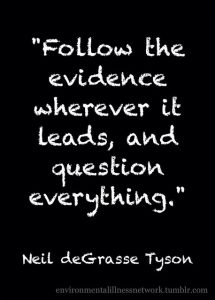116 10.1 Thinking Critically about Information

We live in an information-inundated world. Making sense of facts, opinions, assertions, claims, and appeals has become such a challenge that educators from preschool through higher education now recognize the importance of teaching critical thinking skills. You are especially responsible for applying critical thinking to the information you may use in messages. There are many formulas for critical thinking, but the underlying skill is the ability to ask intelligent questions that help you decide which information to accept on behalf of your audience.
The information strategy you apply as a mass communication professional will usually result in generating far more information than you could ever use in any particular message. Your powers of critical thinking and careful scrutiny are crucial at every step in the process.
Evaluating information requires:
- Careful, detailed analysis
- An eye for discrepancies
- Attention to accuracy
Communicators ask themselves a set of questions:
- What should be verified?
- What needs to be reinvestigated?
- What is the element of risk involved in using the information?
- What are the consequences of putting this information into the public arena?
By asking yourself these kinds of questions, you begin to develop patterns of verification and pathways for tracing information. You need to develop alternative interpretations of facts in order to protect yourself against being taken in or to avoid spreading mis-information.
This evaluation process also helps communicators create fresh and effective messages. News professionals want to figure out other possible meanings of information, to avoid the “handout syndrome.” For example, a journalist receiving a news release about the amazing new features of some just launched product will check with independent experts in the field to get their take on the claims. Advertising professionals want to be creative and original in their selection and use of information for their attention-grabbing messages. Public relations professionals want to select the “best light” material so they and their clients can be sure to target messages properly and in ways that will have the intended effect.
When evaluating the information found via the Internet there are some foundational ideas that need to be remembered.
- The Internet did not invent misinformation or disinformation
- The Internet did not create rumor mongering and propaganda
- The Internet is not responsible for dirty data and stupid statistics
All of these have been around forever. The Internet is just a new distribution outlet. The Internet does make it possible for misinformation, disinformation, rumor mongering, dirty data and stupid statistics to be distributed more quickly and widely than in the past. It is incumbent on you, as the communicator, to develop ways to detect and avoid these information traps.

